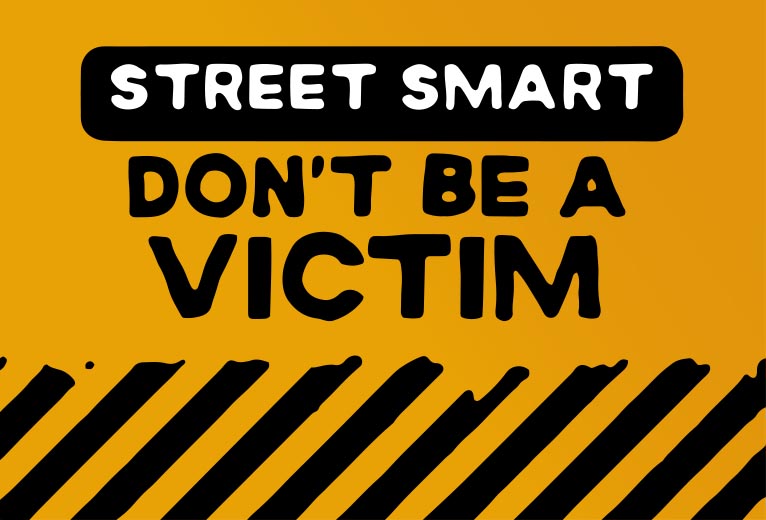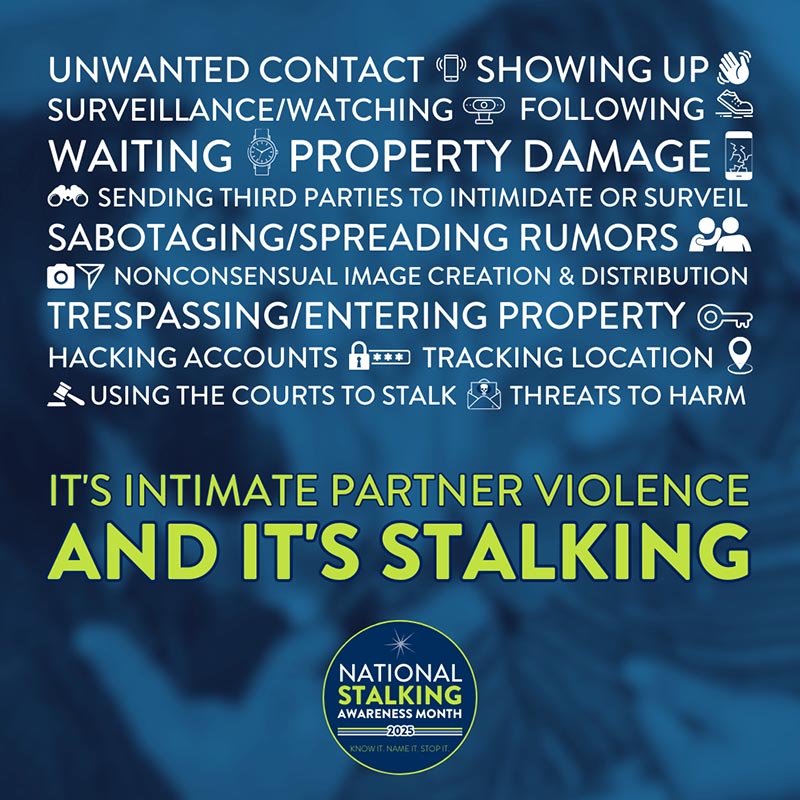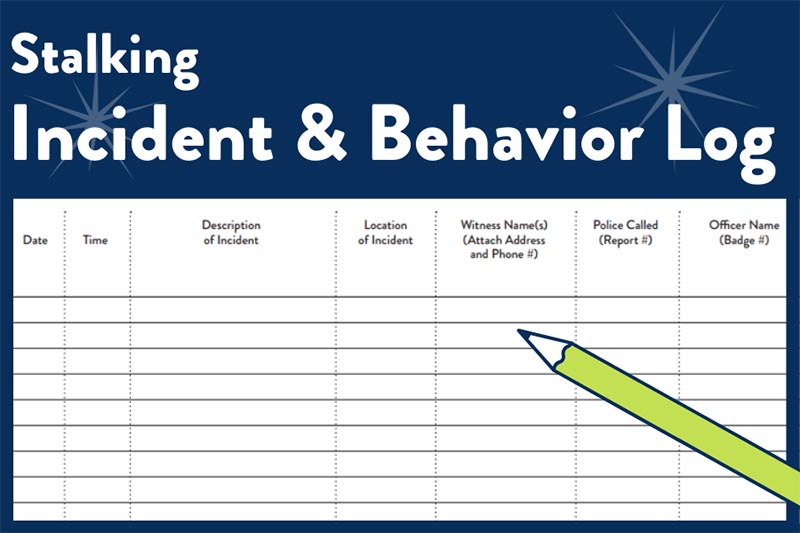

Stalking Awareness in the New Year
January is Stalking Awareness Month. Know it. Name it. Stop it.

The New Year is here—a time for fresh starts and meaningful resolutions. As we set goals that reflect our priorities in life, there’s one resolution we can all commit to in 2025: taking charge of our personal safety.
This January marks the twenty-first National Stalking Awareness Month, serving as an important reminder of the pervasive and serious crime of stalking which often goes unchecked. By aligning safety and awareness with our New Year’s aspirations, we can equip ourselves with the knowledge, tools, and confidence to thrive safely in the months ahead.
Join us this month in spreading awareness about stalking and the risks of violence that follow. We’ll be sharing resources and education from the Stalking Prevention, Awareness, & Resource Center (SPARC) all month long. Together let’s: Know it. Name it. Stop it.
Recognizing Stalking
Defined as repeated unwanted attention or conduct aimed at an individual that causes fear or distress, stalking is often dismissed. Bystanders and even victims may view it as an unfortunate annoyance, rather than a serious crime and potential for violence.
Stalking is far more common than many realize, with alarming statistics underscoring how widespread and dangerous it can be:
1 in 3
Women are Stalked in their Lifetime
1 in 6
Men are Stalked in their Lifetime
13.5 million
Cases of Stalking Reported Per Year
72% of Victims
Threatened with Physical Harm
Source: The National Intimate Partner and Sexual Violence Survey 2016/2017 Report on Stalking
Stalking behaviors vary widely—from persistent calls and text messages to being followed or even spied on. And with the rise of digital technology, stalkers have new avenues to harass their victims, using tools like GPS tracking, spyware, and social media to invade lives from a distance.
While the perpetrator is often someone the victim knows—like a current or former partner—acquaintances, coworkers, or even strangers may engage in stalking behaviors. Regardless of who the stalker is, the effects on victims weigh heavily on their physical, mental, and emotional health, often disrupting multiple aspects of life.

The Risks and Impacts of Stalking
Stalking is more than just an invasion of personal space. Its consequences are far-reaching, creating enduring challenges for victims. Here are some of the most significant risks associated with stalking and its aftermath:
Increased Risk of Physical Violence
Aggression and physical harm are often closely intertwined with stalking behavior. 3 out of 4 women murdered by their partners were stalked first, indicating how stalking often leads to more severe violence. This underscores the importance of taking stalking seriously and seeking help before it escalates.
Emotional and Psychological Harm
Stalking takes a severe toll on a victim’s mental health. The constant fear of being followed, watched, or contacted creates a state of mental fatigue and unease. Victims often experience anxiety, heightened stress, insomnia, and depression. Prolonged exposure to these stresses can spiral into severe psychological conditions, such as Post-Traumatic Stress Disorder (PTSD), making it difficult to move past the trauma even after the stalking ends.
Social Isolation
The fear and paranoia surrounding stalking leads many victims to withdraw from social activities or public spaces entirely. They may avoid friends, family, and coworkers in their attempt to avoid the stalker, ultimately sacrificing vital support systems. Increasing isolation can lead to even further endangerment.
Disruption of Daily Life
Dealing with stalking often forces victims to make life-altering decisions, from quitting their jobs to relocating in search of safety. These disruptions strain finances and emotional well-being, compounding the stress victims endure
While the perpetrator is often someone the victim knows—like a current or former partner—acquaintances, coworkers, or even strangers may engage in stalking behaviors. Regardless of who the stalker is, the effects on victims weigh heavily on their physical, mental, and emotional health, often disrupting multiple aspects of life.
How to Stay Safe and Protect Yourself
The best time to enhance your personal safety is now. Whether or not you’ve encountered stalking in the past, taking proactive measures to safeguard your well-being is a step toward living confidently and securely in the new year. Here are some practical strategies to prioritize your safety and manage stalking risks:

Stay Aware of Your Surroundings
Being vigilant about your environment is one of the simplest ways to stay safe. This includes paying attention to unfamiliar individuals, vehicles, or behaviors that seem “off.” Avoid predictable routines by alternating routes or the times you leave and return home. These small steps can throw off anyone tracking your movements.

Strengthen Digital Security
The digital realm is a common space for stalkers to exploit. Strengthen your defenses by using complex, unique passwords for online accounts and frequently updating them. Check your social media accounts for privacy settings and avoid sharing sensitive information like your location, address, or family details. Whenever possible, deactivate GPS-enabled apps and disable location-sharing on your devices.

Document Everything
If you suspect stalking, keep a record of anything unusual, such as unsolicited messages, unexpected visits, physical interactions, or sightings of the stalker at different locations. Take screenshots of text messages or emails and save copies of written correspondence. This documentation is invaluable for law enforcement.

Inform Trusted Individuals
Inform friends, family, or coworkers of the issue along with any precautions you’re taking. While they can provide emotional support, they can also help you keep an eye out and provide support in an emergency.

Set and Enforce Boundaries
If it feels safe to do so, clearly communicate to the stalker that their actions are unacceptable and must stop. Avoid continuing communication thereafter, as further responses may unintentionally encourage their behavior.

Trust Your Instincts
You know your life and patterns better than anyone. If something feels out of place or alarming, take it seriously. Listen to that gut feeling—it’s usually right.

Carry Self-Defense
Non-lethal self-defense tools can offer practical, immediate protection against potential threats. Options like personal alarms, pepper sprays, or innovative devices like the HERO® 2020 and AIIRO® are designed to incapacitate attackers and allow victims time to escape dangerous situations.
Powerful, Reliable Defense Tools
We understand how vulnerability can feel paralyzing. It’s why our focus is not just on products, but on the training and education to empower individuals to act when it matters most. Our devices prioritize safety, ease of use, and empowerment:
- HERO® 2020 offers powerful and concealable non-lethal defense from a distance. This patented device delivers advanced multi-format stopping power with multiple built in safety features, ensuring protection is both reliable and simple to use.
- AIIRO® offers the same powerful results in an even smaller device. Its irritant gel covers and sticks to the target, disabling them for up to an hour and is available with an ear piercing 120dB alarm.
Every HERO® device is built with a deep understanding of the challenges individuals face when their safety is at risk. Ease of use, reliability, and concealability are the driving factors behind our product designs. These core principles earned both HERO® 2020 and AIIRO® awards for excellence in personal defense.
Safety Resolutions for a Positive Year Ahead
Personal safety has become a personal responsibility. As we step into 2025, make it your mission to cultivate a safe, secure, and confident lifestyle for both yourself and those around you. By understanding the risks of stalking, staying vigilant, and leveraging prevention strategies, you can take meaningful steps to avoid harm.
This National Stalking Awareness Month, we challenge everyone to become a part of the conversation, stay informed, and explore tools like HERO® that can protect lives and promote peace of mind.
The new year is full of opportunities—don’t let fear or insecurity hold you back. Together, we can prioritize safety, foster resilience, and build a future where no one has to suffer silently. Be vigilant, be prepared, and be safe in 2025.
Stalking Awareness Resources
If you are in immediate danger or fear imminent harm, always call 911!
If you or someone you know is being stalked, your local domestic abuse or sexual assault service providers are frequently able to offer resources and advice. For additional assistance, or if you do not know or have a local provider, consider contacting:
- VictimConnect: Helpline to learn about rights and options
- National Domestic Violence Hotline: Hotline for crisis intervention, safety planning, education, advocacy, and referrals for survivors; can also provide support for friends, family members, and others concerned about loved ones experiencing situations of abuse.
- Rape, Abuse & Incest National Network: Hotline providing confidential support, assist locating local resources, information about local laws, and basic information about medical concerns
Visit the Stalking Prevention, Awareness, & Resource Center (SPARC) website for more information, resources, and educational materials specific to stalking.

